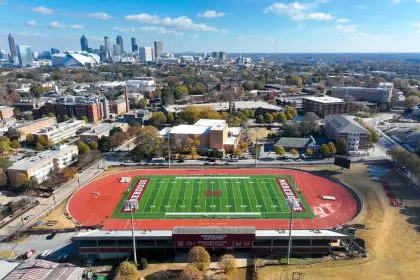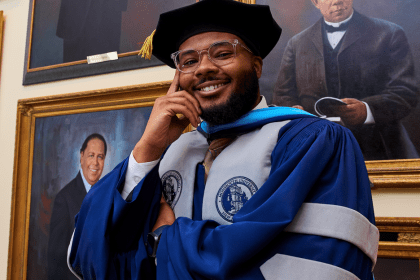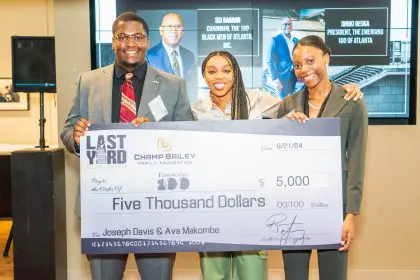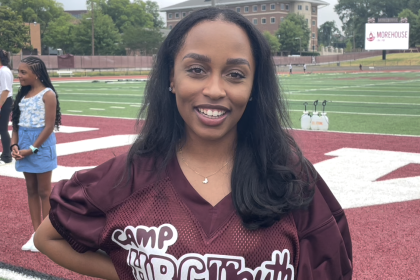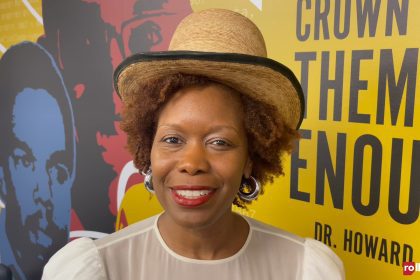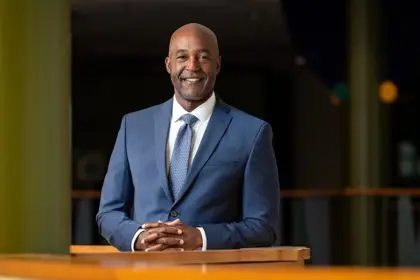
When your college president makes a plea for increasing the level of alumni giving to the institution, there are two known paths to consider: Talk about it, or deliver on it.
Historically Black College and Universities across the nation are full of century long traditions and are the subject of considerable social media hype and promotion. But regrettably, promotion alone doesn’t translate into strong alumni giving back to HBCUs, where most recent figures are almost universally well below the 40% level. Morehouse College’s alumni giving level (fluctuating between 23-29 percent, depending on the reporting source) often comes as a surprise to many in the potential donor pool, especially given the college’s nearly 150-year rich legacy of minting male leaders. But can the Morehouse “Maroon Tigers” actually raise the bar?
Enter Washington, DC-based campaign strategist BMaynard Scarborough who accepted the challenge from Morehouse’s President Dr. John S. Wilson during an April 2013 alumni association meeting in New York City. Scarborough sorted through various engagement strategies and ultimately settled on the build-out of his own alumni faction into a powerhouse in the college’s complicated funding space: the 855-member Alpha Rho Chapter Alumni Association of Alpha Phi Alpha Fraternity Inc.
Scarborough called upon his 30 years of experience as a communications executive, journalist, brand marketer, graphic designer, documentary filmmaker, and most recently a lobbyist, to design an innovative crowd-funding campaign that not only generated more than $220,000 and established Alpha Rho’s first-ever endowed scholarship fund, it also provided for the dedication of an impressive 90th Anniversary Memorial Obelisk on the Century Campus Green in Atlanta.
“We weren’t looking for the next viral sensation or trending topic on social media. We were looking for HBCU alums to step into action with checks in hand and with a willingness to encourage their peers to do the same. Participation is the only true traction that will save our institutions from further decay,” Scarborough asserted.
“$CashTags Over #HashTags” proved to resonate with the almost 400 alumni donors who stepped up in the nine-month active drive. Perhaps more significant than the funds raised is the fact that 68 percent of the alumni contributors to the campaign were first-time donors to the college.
This latest venture to support his own HBCU, Morehouse College, is not BMaynard’s first time at the benefit rodeo. He also saddled up for national funding campaigns at the Joint Center for Political and Economic Studies, the National Association for Ethnicity in Communications One Economy Corporation, Boston Ballet and Morgan Memorial Goodwill Industries. Additionally, he served as director of external affairs and spokesman for the Boston Globe newspaper (then part of the New York Times Company) during the publication of the “Spotlight” investigative series on sexual abuse in the Boston Catholic Archdiocese, which is the subject of the award-winning 2015 motion picture by the same name.
While traditional collegiate fundraising events definitely serve a great purpose in rallying the troops around the flag, Scarborough looks for direct, new audience developments that ultimately bring new or long lapsed donors into the Morehouse giving mix.
How has this fundraising effort changed you as a Morehouse alumnus and what would you say if you were speaking in King Chapel to all Morehouse alumni?
Actually, nothing in my fiber as a Morehouse alumnus changed as a result of this campaign. I’ve never been much of a “meeting for meeting sakes” kind of guy, so at this point in my evolution as a Morehouse booster I’m mainly looking to strategize on how best to roll a good idea down the hill and gather as much green moss (money) as possible. In fact, the APCAA campaign held zero, and I repeat zero, meetings to accomplish our goals. We simply utilized today’s technology – email, social media and exactly one conference call – to motivate our international membership across the finish line. In designing APCAA’s annual fund campaign, we simply applied the same value-added approach many of our alumni work with everyday in their respective corporate settings. We stayed nimble by establishing an independent 501(c)(3) structure – thereby complimenting the existing fundraising structure already in place at the college. Our fraternal peers and several city-based alumni chapters pioneered this pathway to fundraising so it was a model that proved easy to modify for our dual purposes.
What sets the Alpha Rho campaign apart from other affinity group initiatives at the college?
The APCAA campaign was the first of its kind in many regards as the true development of affinity group crowd-sourcing is new to Morehouse, and an unknown variable at other HBCUs. Ours was conceived and executed by volunteer alumni, and it all began with a challenge. A realistic challenge. First recognizing that not every alumnus is capable of making a multi-thousand dollar donation. Our motto was “get in where you fit in,” and in the end making certain that every donor, in any denomination, could easily see their contribution at work. Sure, Alpha Rho’s storied history on the campus was a lead messaging vehicle, but the recurring thread we wove into all campaign collateral was “Morehouse … the Maker of Men … and, Alpha Rho Men.” That pitch extended beyond the 855 living initiates of the chapter. We also welcomed participation from Morehouse Men who joined the fraternity post undergrad or transferred to the college and helped to build the chapter during their matriculation. So, all that is to say, my stomp speech to an audience of potential donors to the college would begin and end with “participation.” We sometimes make very unreasonable assumptions about what a black male is programmed to do with his money. Just because he’s making $500-800K a year doesn’t mean he’s automatically compelled to give say 10% of it back to his college. Everyone’s college experience was different – some loved everyday of it, and others left after four years emotionally unattached to the school. But, therein lies the adjustment APCAA made to reach new donors – we promoted the loyalty and historical significance of the chapter’s 90th anniversary foremost. It now becomes the role of the college to nurture these new or long-lapsed donors by utilizing personalized messaging that speak directly to them going forward.
How do you plan to continue this fund raising process?
The development of APCAA’s 2015 endowed scholarship fund was by no means a one-shot deal. A major consideration for me in developing the Alpha Rho campaign was how to sustain donor participation for decades forward. As of this writing, our 2016 campaign chairman, Charles S. Johnson, is already in place and building upon the introductory campaign from last year. But this year’s fund drive will rely largely on the engagement of the college in the execution. It was our intention to kick-start a nation-wide movement that leads to a measurable increase in the level of alumni giving at HBCUs. Since our own campaign launched, we’ve fielded “how-to” inquiries from not only other Alpha alumni chapters, but also from our fraternal peers from Morehouse and other leading HBCUs. And in all cases – APCAA’s mindset is to share and encourage campaign strategies that lead or enhance fundraising initiatives and increase alumni participation. Regardless of whether donations arrive in lots of $5 or $50,000 – every HBCU benefits when alumni participation rises – and that’s a trend that foundations and other grant organizations factor in highly when making decisions about where to make investments. The “Morehouse Mystique” is now, and will always be a solid selling point for recruitment and fundraising. And when it comes to worldwide matters of health, education, finance, civic engagement, STEM, and how they relate to male development, Morehouse should be center-stage in the discussion, a thought-leader and actually serve as the convener and looked upon to promote best practices and ideal talent to the world. Think “T.E.D. Conferences” that focus on matters Morehouse Men are raised up to lead, fix and discover. From my experience, there’s sponsor support out there to make this a reality, and very profitable too!
What has made the Morehouse chapter so influential?
Our engagement in the preservation of the “Morehouse Mystique” has a long, storied history. Alpha Rho Men have served in leadership roles at pivotal times in the college’s history. Specifically, the 7th President of Morehouse, Dr. Hugh M. Gloster, pledged Alpha Rho in Fall 1930, and our current Chairman of the Board of Trustees, Robert C. Davidson (Fall 1964), is also a member. Current Trustee Members include Brothers Willie J. Davis (Fall 1954), Charles H. James II (c/o 1981), and General James R. Hall (Fall 1954). Prominent Chicago-based theologian Brother Rev. Otis Moss, Jr. served as a trustee for many years, ending in the early 2000s. These men have set positive examples in leadership that every initiate of our chapter is challenged to meet, match or exceed. While not all chapter alumni aspire to the ranks of trustee membership, there are strong leadership representatives in every sector of society that we called upon to reach our goals. So, combining our influence at the Board of Trustees level with our influence at business strategy in the corporate world made for an excellent approach. It’s all about how you mobilize your influence that makes the difference for the college’s bottom line. I chose the fraternity route only because it just happened to be the affinity group I most closely identified with, and the one that had the most influential posture when it came to going from concept to reality in record time. But it needs to be made clear that a long-term strategy for Morehouse to increase the level of alumni giving is not fraternity-specific.
Three reasons it is important for Morehouse alumni to become more active givers to Morehouse?
The leading rationale has to be that higher alumni giving levels influence funding partners. Second to that, providing scholarship funds helps the school remain competitive in attracting next generation leaders. And third, but certainly not least, giving back to the college completes the circle of leadership that every Morehouse Man begins when they first pass through the arch during freshman week. But it should be underscored that we didn’t just ask Brothers to write a check, we went steps further and conducted our own Alpha Rho International Census (APIC) that recorded statistics on past giving levels, member relationships with college or fraternity groups, all in hopes that our data could provide expert guidance for Morehouse as they look to duplicate our successes.
What are the roots of your alumni engagement for Morehouse?
The actual seed of alumni engagement began for me back in the 1990s when I co-developed a funding extension to Boston’s popular annual visit by the Morehouse Glee Club – our legendary 105-year old touring ambassador program. Along with fellow alumnus Demetriouse Russell (c/o 1988), we developed an innovative corporate gala, “The Mo’ Better Gala,” that attracted the energetic participation of Alumnus Spike Lee and was championed by then-chapter president Dr. John S. Wilson. That partnership for the Greater Boston Morehouse Alumni Association lives on today in the viability of the chapter’s $600,000+ endowed scholarship fund at the college. So, much like was called for in the 1990s … innovative solutions to complex funding scenarios is a specialty I’ve woven into each of my career and volunteer situations.
What is the role of fraternities at today’s HBCUs?
Fraternities are only one of a myriad of affinity groups that can share leadership roles in today’s HBCU funding environment. Fraternities (and sororities elsewhere) are, however, tied to some of the longest historical storylines at HBCUs, exclusive of the colleges themselves, and it’s safe to say that fraternities are tailor-made to ignite the entire HBCU alumni community into a participatory mode that mirrors even the ivy leagues. Morehouse is in a unique position to capitalize on not only its upcoming 150th anniversary, but to also work in concert with a consortium of affinity groups that owe their very existence to the Atlanta-based HBCU. So, Morehouse’s yet-to-launch fundraising bench is not limited to fraternities. The strategic organization of alumni members from the world-famous Glee Club, our marching and jazz bands, dormitory-specific clubs, sports teams and so on, is definitely on Morehouse’s radar now that APCAA has provided a profitable blueprint for how to best organize and maximize.
What type of financial and cooperative fundraising challenge with all Morehouse fraternities participating would you like to see?
It’s already materializing. The next era of affinity group giving is in motion within the Morehouse family – specifically, a first of its kind collaboration between all four fraternities that have already established endowed scholarship funds at the college. It should be noted that the Omegas were first to launch a planned giving initiative eight years ago, soon followed by the Kappas, and just recently the Sigmas got underway with theirs. Now with the Alphas rounding out the quadrant, the opportunity to work in concert toward an even higher yield for Morehouse is eminent. All four fraternities are scheduled to host a joint fundraising “Day Reception” on October 28 during our 2016 homecoming in Atlanta. The coming together of four leading fraternities will be historic in its own right – but the benefit for the college is likely, and hopefully to be infectious.
Name seven of the most current young Alpha Rho Alumni who participated and are having great careers (since 2000).
Many of the senior leaders in APCAA’s recent campaign thought it was crucial to building a sustainable annual campaign that we position a leadership roster of younger chapter Brothers for Morehouse’s future. To that end, these young generation members helped drive home our current success, and are well positioned to move the campaign forward in 2016. They include:
- Kenneth Andrew Williams (fall 2010): Kenny recently transitioned from Deloitte Consulting to take on the role of director of business development for The Scholarship Academy, an education nonprofit that offers a comprehensive, curriculum-based approach to help low income students secure funding to pay for college. In this role, he is responsible for securing new partnerships and scaling the organization’s impact nationally.
- Chukwudi Joseph Nwadbia (fall 2010): Chuk is currently based in Haiti and is a Thomas R. Pickering Fellow with the U.S. Department of State. He is also completing a master’s dual degree program with Columbia University (SIPA) and The Paris Institute of Politics (Sciences Po). He studied International Security Policy and Global Governance at SIPA and Sciences Po, respectively.
- Marcus “Hank” Noel (spring 2007): Hank is the founder of Heart of Man (HōM) – Noel transitioned from a ConnectedED Fellow in the US DOE to a full-time social entrepreneur in 2015. HōM is an immersive entrepreneurship program and online marketplace that teaches STEAM skills (science, tech, engineering, art, math) to middle and high school students through human-centered design, entrepreneurship, and digitally based skills required to compete in the 21st century.
- Ralph McKinley Woolfolk IV (spring 2007): Ralph serves as the director of public relations and spokesman for the 2,000-member Atlanta, Georgia Police Department (APD).
- John Lee Gaston White (spring 2005): John is a global business development professional currently serving as the head of ANZ & Asia Pacific Markets with MetricStream Inc. He has worked extensively in the United States, India, South Africa, Australia, New Zealand and Southeast Asia.
- Joshua Hubert McNair (fall 2003): As the virology clinical consultant for Monogram Biosciences, Joshua is a sales executive and clinical consultant to HIV/HCV/Infectious Disease providers in a territory spanning the state of Maryland to Puerto Rico, marketing HIV & HCV resistance assays and breast cancer molecular diagnostic testing. He is also the first vice president of the West End Neighborhood Development and Public Safety Council (Atlanta).
- Winston W. Roberts (fall 2013): Winston serves as a legal assistant at Harris, Wiltshire & Grannis LLP, and former Sales Staffing and Recruiting Intern and Student Ambassador at Google Inc.

